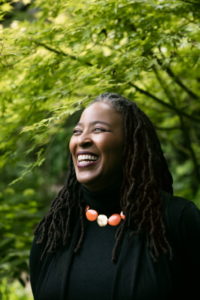Camille Dungy has added another honor to her long list of accomplishments.
The University Distinguished Professor in the Department of English at Colorado State University has had a poem published by The New Yorker magazine.
Dungy, who read one of her poems at the Democratic National Convention last year and another published by the New York Times Magazine in 2018, won a prestigious Guggenheim Fellowship two years ago. She says that as part of the fellowship, she committed to writing poetry every day, a practice that led to “Let Me,” the poem that appears in the April 12 issue of The New Yorker.

The poem, which serves as both a letter to America and a tale of an abusive lover, was written over the course of a couple days late last fall.
“Not everything works when you write every day, but this poem felt really good, and it felt ready for the world,” she explains. “So when I finished, I let it sit for about a week, which I usually do, then sent it to The New Yorker because I thought it might find a good home there.”
‘Sense of being seen’
It’s the first time her work has been published by the magazine.
“That’s a life goal for a writer, to have their work in The New Yorker,” Dungy says. “It’s very exciting. I’ve had several old friends who’ve said, ‘That’s the mark of when someone is really a poet.’ That’s not the way I see it, but I do know that for the general public, it feels real to people. So that’s just nice, in my community, to have that sense of being seen.”
In “Let Me,” Dungy refers to some of her own personal experiences last year, from a bear that wandered through her cul-de-sac to the wildfires that ravaged Colorado.
“There’s the real-world fact of the fires, and the real-world fact of what it feels like to be Black and a woman in America,” she says. “There’s also the real-world fact of how complicated relationships can be, in the sense of, ‘He was good to me sometimes, and then sometimes it was super-dangerous.’ And that feels like a fact about my experience in this place that I love and that is my home, but that can also sometimes be violent, scary and cruel.”
Impetus for the poem
Dungy adds that the poem is not a response to any specific events or movements that occurred in 2020, but is a reflection on a long history.“Nothing happened last year in America that hasn’t been happening in America for hundreds of years,” she explains. “Maybe the only thing that happened last year was some kind of raised consciousness among a lot of other people on whom these traumas are not regularly visited. But I can’t say that, for me, last year was some sort of revelation.”
The online version of “Let Me” features audio of Dungy reading the poem, which she recorded in the CSU Center for Literary Publishing’s podcast recording studio in the Tiley House.
Dungy has received many other honors in recent years. In 2019, she participated in the 1619 Project, a multidisciplinary initiative marking the 400th anniversary of the beginning of American slavery. In 2018, she was the only person to be nominated for the Colorado Book Award in two categories, winning in poetry for Trophic Cascade. In addition, she won a 2017 National Endowment for the Arts Award in prose for her debut collection of essays, Guidebook to Relative Strangers: Journeys into Race, Motherhood, and History, which was also a finalist for the National Book Critics Circle Award.
The Department of English is part of CSU’s College of Liberal Arts.